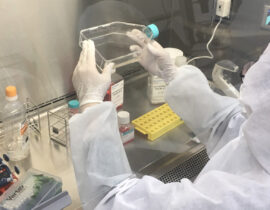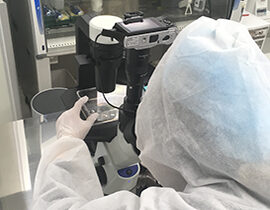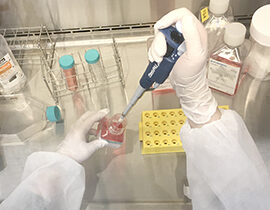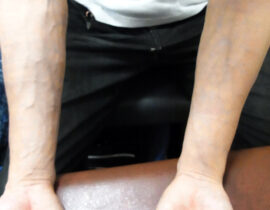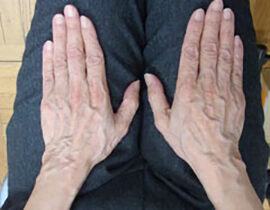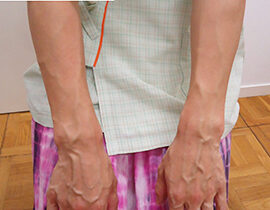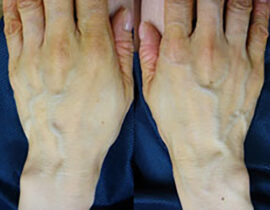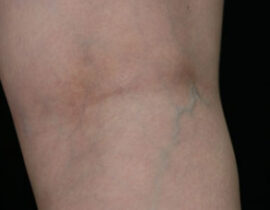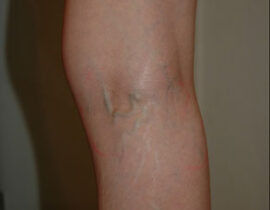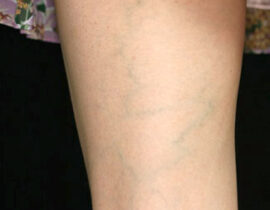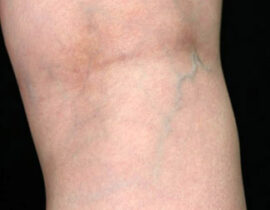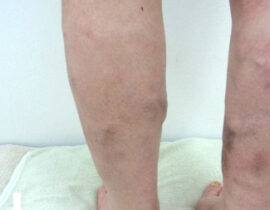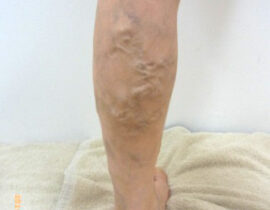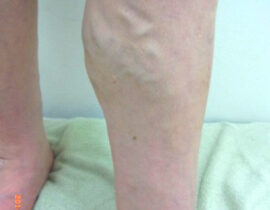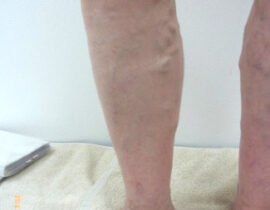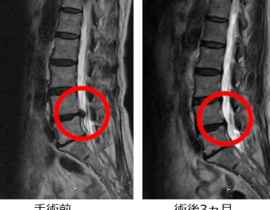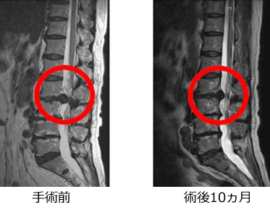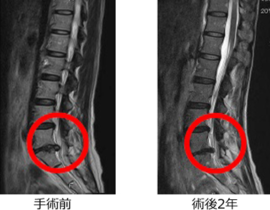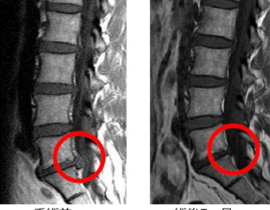Regenerative Medicine
1.Regenerative Medicine Using Autologous Adipose-Derived Stem Cells (ASC treatment)
The ASC treatment, also known as regenerative medicine, aims to improve and repair functionally and organically damaged organs and tissues by transplanting the multiplicated autologous adipose-derived stem cells to the human body. This treatment has been widely used in many clinical studies and is highly anticipated to treat the current refractory diseases.
Adipose-Derived Mesenchymal Stem Cells (ASCs)Mesenchymal stem cells (MSCs) are tissue stem cells and can be derived from various adult tissues, such as adipose, bone marrow and umbilical cord blood. They can differentiate to neurocytes, adipocytes, myocytes, osteoblasts, chondrocytes and other cell types. They also can repair damaged cells and aged cells.
On the other hand, bioactive factors secreted from the MSCs spread to surrounding tissues and directly play a crucial role through immune system regulation, angiogenesis, anti-inflammatory, antioxidant and anti-apoptosis whereby repair of damaged tissue occurs (paracrine effect).
The ASCs are a type of MSCs derived from adipose tissue. Compared to other types of stem cells, the ASCs have excellent features: easy and safe to use, high proliferation capability, and less aging effects as well as slight decrease of osteogenic differentiation potential along with cell proliferation. The ASCs have been studied to treat various diseases, such as arteriosclerosis causing myocardial infarction and stroke, degenerative cranial nerve diseases including Alzheimer's disease, osteoarthritis, sports trauma, chronic lung disease, and chronic kidney disease.
Disadvantages of the ASC Treatment
There is no success guarantee on clinical outcomes since the ASC treatment depends on self-reparation and regenerative ability of the ASCs. Although the ASC treatment represent great promise for patients who lack good medical alternatives, there are some challenges as follows.
2.Treatment Method
A small amount of fat is collected from a surgical incision of 3 mm in abdomen or back, and then immediately sent to our Cell Processing Center (CPC) for cell separation and culture. After 3 to 4 weeks, administration of ASCs ranging from 1 to 2 billion is performed .
Please check “Treatment Flow” below.
3. Adverse Events
【During fat collection】After surgery, it is common to have some minor bleeding from the incision. Internal bleeding, also occurring as an expected result, will disappear in 1 or 2 weeks.
You may need antibiotic and analgesic medicines.
You may experience allergic reaction to the anesthesia such as palpitation, hives and difficulty breathing.
【About administration of the ASCs】
4.Targets of the ASC Treatment
We provide the ASC treatment to the following diseases.
- Deterioration in physical and physiological function with aging
- Chronic pain
- Dementia
- Arteriosclerosis (including myocardial infraction and stoke)
- Sports injury
- Neurodegenerative disease
- Heart failure
- Chronic pulmonary disorder
- Chronic kidney disease
- Chronic liver disorder including cirrhosis and liver fibrosis
- Inflammatory bowel disease
- Aneurysm
- Diabetes
- Infertility
- Alopecia
Following patients are excluded from the ASC treatment.
Patient with at least one of the following 1)-6) symptoms can receive the ASC treatment for arteriosclerosis.
1)History of myocardial infarction or angina.
2)CT findings of irregularity , calcification, stenosis or obstruction in the coronary artery wall.
3)History of cerebral infarction.
4)Findings of cerebral infarction in brain MRI and MRA.
5)Patient with 2 or more second-degree relatives diagnosed with arteriosclerosis.
6)Patient who was diagnosed with higher risk of arteriosclerosis by a genetic test.
7)Patient with intermittent claudication due to arteriosclerosis.
Patient with at least one of the following 8)-37) symptoms can receive the ASC treatment for dementia.
8)Trouble remembering what you know and the names of familiar people
9)Trouble finding right words and use more pronouns in the conversation such as “it” and “that”
10)Trouble remembering the names of the people close to you such as your wife, husband, son, daughter and grandchildren
11)Forgetting to bring things with you or forgot to put the things aside
12)Leaving the shopping bag kept on the floor after the shopping
13)Forgetting to close a water or a gas valve.
14)Trouble remembering the location of a wallet and a key
15)Retelling same stories repeatedly
16)Retelling same stories or asking same questions repeatedly
17)Talking to the person for the same matter repeatedly
18)Losing interest in anything even how you dress
19)Losing interest in the favorite hobbies
20)Losing interest in learning and even stopping going to the school
21)Difficulty paying attention and feel absent and how you dress
22)Losing track in the conversation
23)Difficulty reading facial expression and someone else’s feelings
24)Losing track in the conversation and difficulty understanding the story
25)Difficulty understanding the conversation among more than one person
26)Problem remembering the schedule
27)Problem remembering the schedule without notebook
28)Forgetting the plan and late for the schedule, and mistaking the date
29)Forgetting the schedule which you don’t realize
30)Trouble remembering the recent events
31)Trouble remembering that you went out with family recently
32)Forgetting that you already had a meal few hours ago
33)Forgetting that you had phone call right after hanging up
34)Easily getting lost
35)Losing direction of a place which you should know well
36)Disorientation even on the road you often take
37)Difficulty remembering where you are going while you are walking
Patient with at least one of the following 38)- 52) symptoms can receive the ASC treatment for arthropathy.
38)Pain as bending and stretching
39)Difficulty moving the joint after resting without moving for a while
40)Worsening pain in humid day
41)Continuous pain or recurring pain
42)Joint pain during or after the exercise
43)Difficulty moving the joint freely
44)Difficulty relieving pain by medicine or a cane
45)Difficulty sleeping due to the pain
46)Difficulty moving the joints or the joints move only for a certain angle
47)Difficulty moving the joints or you have swelling on the joints
48)Difficulty walking or walking up the stairs
49)Difficulty sitting in a chair or standing up, and getting in or out of a bath
50)Morning stiffness of joints which will heal soon
51) Squeaky joints
52) Experienced knee injury in anterior cruciate ligament
Patient with any of the following 53)-56) diseases, including spinal diseases and osteoarthritis, can receive the ASC treatment when improving symptoms is not enough by existing treatment (conservative treatment or surgical treatment).
53)Disc herniation
54)Spinal stenosis
55)Chronic back pain
56)Osteoarthritis
57)Spinal Disc injury
Patient with at least one of the following symptoms can receive the ASC treatment for chronic pain
58)Primary chronic pain, such as fibromyalgia, non-specific LBP and chronic pelvic pain
59)Chronic pain after cancer treatment including surgery and radiation therapy
60)Post-traumatic pain
61)Chronic neuropathic pain
62)Chronic visceral pain
63)Musculoskeletal pain
5.Treatment Flow
We collect a blood sample for the following infectious diseases before fat collection for hepatitis B and C, HIV, syphilis and HTLV. Test results usually take about a week or so.
→If you have test results within past 12 weeks prior to fat collection, the blood test is not required again.
We collect a small amount of fat under the local anesthesia. It usually takes about 30 minutes. You may take a shower as usual, however, can take a bath in a week or so due to the suture of incision. In addition, we will collect your blood and separate the serum for further cell culture.
Multiplication of the ASCs from the fat takes over 3 to 4 weeks. Normally, we notice you to decide the date for administration in about two weeks after the fat collection. Administration are carried out for 2 days in a row (e.g. Monday to Tuesday, Thursday to Friday, Friday to Saturday).
You will return our clinic for follow-up observation regularly.
If your stem cells were cyropreserved, you could have them administered additionally.
6.Our Strengths
→We can rapidly separate, collect and administer the ASCs, avoiding cell aging and loss by time delay.
→We can ensure quality control during the cell culture and provide high-quality cells for administration.
→Our clinic is the first medical institution in Japan authorized for intra-arterial administration and intrathecal administration of the ASCs. These two administration methods are used when necessary.
Kita Aoyama D.Clinic
Address:ARK WISE BLDG.3-7-10, Jingumae, Shibuya-ku, Tokyo, 150-0001, Japan
Tel:+81-3-5411-3555
Fax:+81-3-5411-5666
Email:info@dsurgery.com

